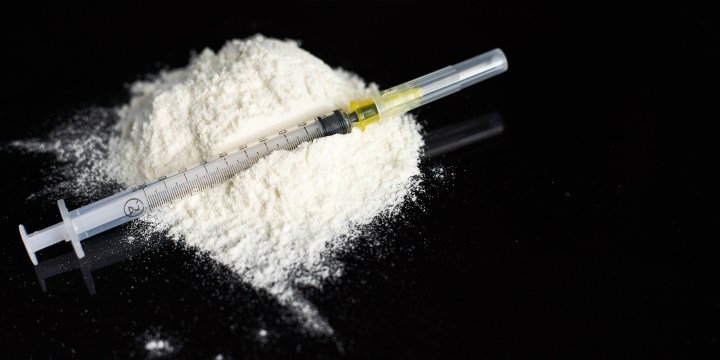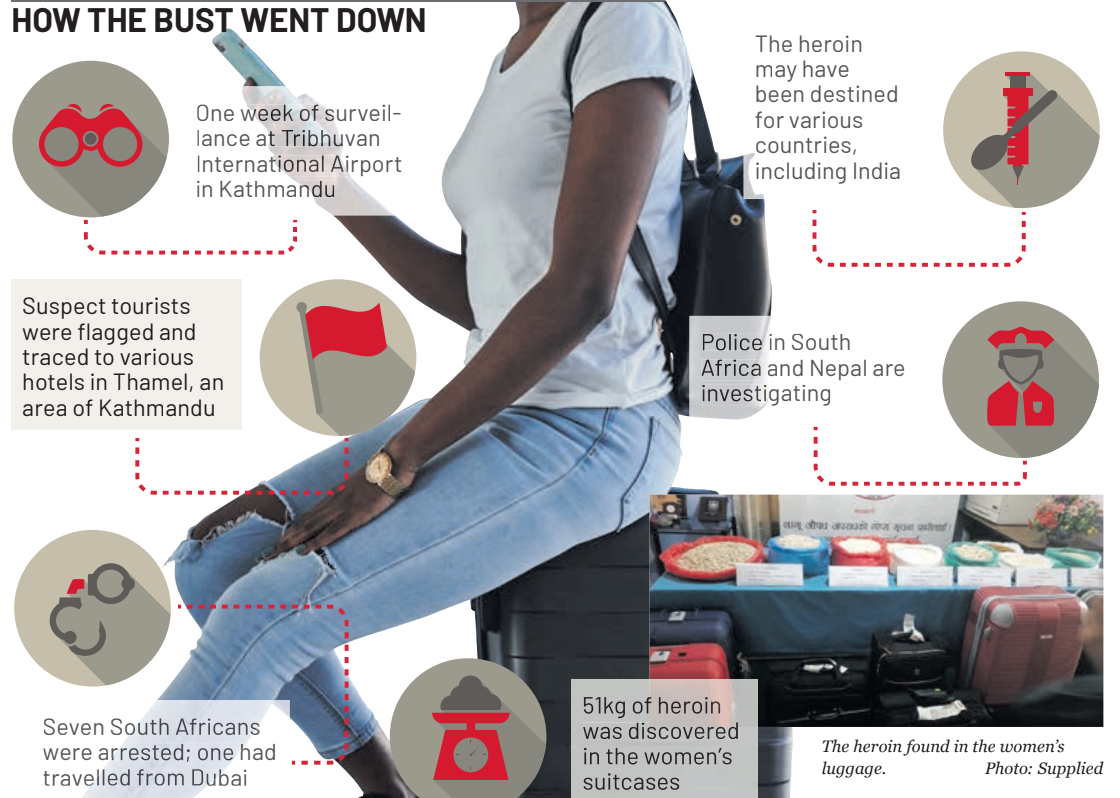GLOBAL DRUG TRADE
Arrest of seven South African tourists in Nepal heroin bust sparks international probe

Drug packages were traced to planes arriving in Nepal, allegedly carried by SA passengers aboard flights, and were then tracked to hotel rooms in Kathmandu and finally discovered hidden in suitcases.
International drug trade links are under investigation after seven tourists from South Africa were arrested in Nepal and a total of 51kg of heroin was allegedly found in their luggage – the biggest such drug bust for the South Asian state.
While police in Nepal are looking into potentially new drug trade routes that extend to South Africa, police in this country have confirmed they are trying to figure out where the heroin originated.
South Africa’s cops are also trying to determine who is involved in the syndicate, or syndicates, operating via Nepal.
This week, national police spokesperson Colonel Athlenda Mathe said to DM168: “The South African Police Service (SAPS), through its liaison officer in India, are working closely with authorities in Nepal on the case where seven women were found in possession of heroin and subsequently arrested.
Heroin and Taliban links identified in Operation White Dust
“Investigations are currently ongoing to determine the origin of the drugs in South Africa and to determine how many more people are involved from South Africa.”
The bust in Nepal, in June and involving seven arrests, has been dubbed Operation White Dust.
It was not immediately clear where the heroin was ultimately destined for, but it is believed Nepal was a transit point. One theory is that it might have been on the way to India.
DM168 has previously reported how consignments of heroin meant for various international markets are being smuggled through South Africa and are ending up in India, and vice versa.
Some suspects are believed to have flown to India from Johannesburg via Doha, a route that is part of a network, which is believed to be used by criminal groups with ties to the Taliban.
Seven South African women were arrested in the June bust
In the June bust in Nepal, the people arrested appeared to be drug mules – individuals low down on the drug trade hierarchy who are used to “courier” contraband.
According to a statement the Nepalese police issued in June, that country’s Narcotics Control Bureau arrested the seven South Africans and seized the 51kg of heroin.
The crackdown involved a week-long surveillance operation at the Tribhuvan International Airport in Kathmandu.
Suspicious tourists were then flagged and arrested at various hotels around Thamel, an area of Kathmandu.
All seven arrested suspects are women.
The Kathmandu police provided their identities, but it is not clear whether they have been formally charged so DM168 has withheld their names. This week, Department of International Relations and Cooperation (Dirco) spokesperson Clayson Monyela confirmed it was aware of the arrests of the women.
South African diplomats say they cannot share any more info
“The SA High Commission in New Delhi is rendering consular assistance through the South African Honorary Consul in Kathmandu,” he said.
“No further info can be shared as the detainees gave no permission to share further news with the media.”
The seized heroin was allegedly found hidden in their suitcases.
In a video of a police press conference held in Nepal, footage of plastic bags containing white, beige and brown crumbly substances and clumpy powders – presumably the heroin – was shown.
There was also footage of suitcases, of the sort commonly used for air travel, that were presumably used to carry the heroin.
A Nepalese official could be heard saying the heroin clampdown was the largest in the history of the Narcotics Control Bureau.
Hands cuffed and heads bowed, with black fabric covering their faces
The women were also shown in the video – with their hands cuffed and some of them with their heads bowed.
They each wore black pieces of fabric, either covering their faces fully or covering just their mouths and noses.
A label attached to a travel bag indicating a flight path suggested one of them had travelled from Dubai on 13 June and arrived in Kathmandu the next day.
Based on the footage, it appeared two of the women had travelled together, allegedly with 16kg of heroin between them.
Aside from those two, it seemed the other women had travelled individually with varying amounts of heroin.
The local publication Spotlight Nepal reported that Jeevan Kumar Shrestha, the superintendent of the Nepalese police force, said: “All seven women came from the same country but were used as carriers by different groups. Only [three women] were operated [sic] by the same group. We have also identified their operators in South Africa.”
The suspects reportedly had valid visitors’ visas that would only have allowed them to stay in Nepal for a few days.
Nepal might have been a transit point and the drugs were heading to India
“The drugs were not removed by the women after they reached their hotels. They were rather touring the city.
“The heavy quantity shows that Nepal was not the final destination but rather a transit,” Shrestha was also quoted as saying.
It was suspected the heroin may have been destined for a number of countries, including India. While that could be the case, India and Nepal are known as countries linked to the international trade in cannabis.
According to the UN Office on Drugs and Crime’s World Drug Report of 2022, both the South Asian countries of Nepal and India are known to be source regions for cannabis.
A border that is ‘highly susceptible’ to cannabis trafficking
Nepal was also one of the most frequently mentioned Asian countries in terms of the “origin, departure, and transit for cannabis herb” from 2016 to 2020.
In 2020, India’s ministry of home affairs flagged the border between India and Nepal as “highly susceptible to cannabis trafficking”. DM168
This story first appeared in our weekly Daily Maverick 168 newspaper, which is available countrywide for R25.





















 Become an Insider
Become an Insider
Probably from South America
Why is cannabis mentioned? What does that have to do with heroin trafficking, other than a spurious association?
In a similar vein, the news of the arrest of a top American basketball athlete with being in possession of cannabis oil (not cannabis!) is equally perplexing. Are the two the same thing ? BUT then we need to remember this is more about the leveraging of politics, rather than the pursuit of rational justice.
It seems like the south American route via south africa and further is well established!!!
Heroin originates in South-East Asia. It’s unlikely that it traveled to SA and then all the way back, especially with the limited flights between SA and the rest of the world.